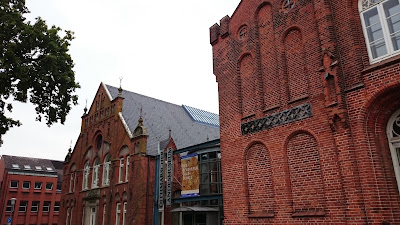Heute wollte ich mir ein Fußball- und ein Rugbyspiel anschauen.
Aber erstmal kurz in die
Fabrik, um beim dortigen Markt ein paar
Macarons und ein paar
Kunstkarten zu besorgen ... im Anschluss noch ein kleines Frühstück in der
alpe altona.
Dann ging's aber in das Rudi-Barth-Stadion, um mir das Spiel des
HFC Falke gegen Cosmos Wedel 2 anzuschauen. Der HFC Falke ist nach dem Vorbild des
FC United of Manchester von HSV-Fans gegründet worden, die genug von der Kommerzialisierung des Profi-Fußballs hatten. Aktuell steht die Mannschaft an der Tabellenspitze der Kreisklasse 5 und spielt vor m.E. recht vielen Zuschauern, die gut Stimmung machen - ich würde mal behaupten, dass sie damit in dieser Spielklasse die große Ausnahme bilden.
 |
| Das 2:0 per Elfmeter - zur Halbzeit stand es 5:0, der Endstand war 9:0 ... ähm, für die Falken natürlich |
Zum Mittag dann ins
Zum Spätzle.
Danach habe ich mir zum Abschluss noch das Rugbyspiel des
FC St. Pauli gegen RU Hohen Neuendorf im Stadtpark angeschaut - liegt ja praktisch um die Ecke von meiner Wohnung.
 |
| Hier spielt also Hamburg Rugby ... |
 |
| Familiäre Atmosphäre im Grünen und überlegene Hausherren - Halbzeitstand 24:7, Endstand 31:12 |

























